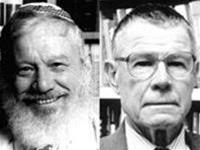 The “Game Theory of Economic-Political Conflict, from Arms Race to Price Wars” by the Israeli-American economist Robert J. Aumann and American economics professor Thomas C. Schelling won the Nobel Prize in Economics in 2005.
The “Game Theory of Economic-Political Conflict, from Arms Race to Price Wars” by the Israeli-American economist Robert J. Aumann and American economics professor Thomas C. Schelling won the Nobel Prize in Economics in 2005.
This marks the sixth consecutive year that an American has won the Nobel Prize in Economics, or at least shared in the honor.
Schelling, now 75, is a professor of economics at the University of Maryland and an honorary professor at Harvard University. Professor Aumann, who is 84 this year, previously worked at the Hebrew University of Jerusalem. The two utilized game theory analysis to “explain forms of economic conflict, such as price wars or trade disputes, as well as why some communities are more successful than their rivals in managing common resources.”
This approach clarified the reasons behind many concepts, from trade guilds and organized crime to salary negotiations and international trade agreements.
Speaking from Israel via phone, Professor Aumann expressed his complete surprise and overwhelm at this victory. Interestingly, despite winning the Nobel Prize together on the same topic, the two professors have never had the opportunity to collaborate.
“They (the Nobel Committee) linked us together because Professor Aumann is the one who invented game theory, while I am the one who applied it. I have used this theory to help me explain conflict situations as well as opportunities,” said Professor Schelling.
According to the Royal Swedish Academy of Sciences, Professor Schelling made significant contributions by pointing out that “an organization/party can strengthen its position by publicly undermining and disparaging its own choices, and that the ability to retaliate is often more useful than the ability to resist attacks…” These insightful and sharp analyses have clarified the close relationship between conflict resolution and efforts to avoid war.
Meanwhile, Professor Aumann’s work is highly regarded for demonstrating how real-world situations can affect and influence theory.
Game theory is often used in political or military contexts to explain conflicts between nations, but Aumann has shown that it can also be applied to the business world. “Understanding game theory will help us explain economic conflicts such as price competition or trade wars,” remarked Jorgen Weibull, Chairman of the Nobel Committee.
Professor Aumann was born in Frankfurt, Germany, but holds both American and Israeli citizenship. He is not the first Israeli to win the Nobel Prize in Economics; in 2002, Daniel Kahneman, also an American-Israeli professor, shared the award with another American author.
Last year’s Nobel Prize in Economics was awarded to Professor Edward C. Prescott of Arizona State University and Norwegian economist Finn E. Kydland of the University of California for their research on the impacts of government policies on the global economy and why supply shocks (for example, rising oil prices) negatively affect business cycles.
The Nobel Prize in Economics, valued at $1.3 million, is the only category of the Nobel Prizes not included in Alfred Nobel’s will. Other categories such as Medicine, Physics, Chemistry, Literature, and Peace were awarded for the first time in 1901, while the Nobel Prize in Economics was independently established by the Central Bank of Sweden in 1968.
Châu Anh (According to AP)

















































